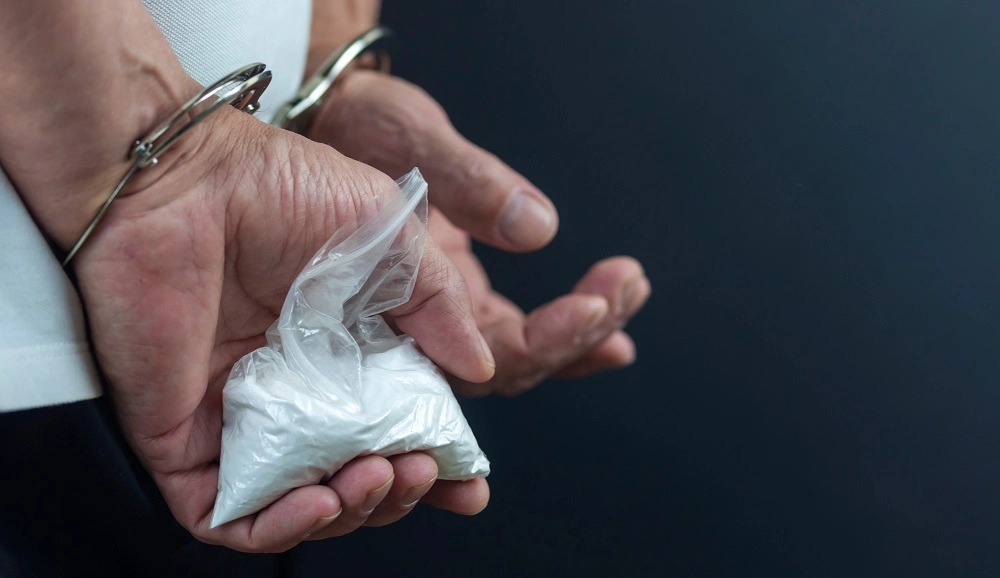Ohio Penalties for Drug Trafficking Offenses
To differentiate between drugs, Ohio has adopted drug schedules that divide controlled substances into five categories. The category affects the penalties for drug crimes. The scheduling of a controlled substance depends on its usefulness and risk of addiction.
- Schedule I includes the most dangerous drugs, such as heroin, LSD, mescaline, psilocybin, peyote, Ecstasy, MDMA, GHB, and THC from marijuana.
- Schedule II includes useful but dangerous drugs with a high risk of addiction, such as cocaine, codeine, oxycodone, morphine, fentanyl, methadone, methamphetamine, and pentobarbital.
- Schedule III includes medically useful drugs with a moderate risk of abuse, such as anabolic steroids, barbiturates, and ketamine.
- Schedule IV includes useful drugs that rarely cause dependency, such as Soma, Klonopin, Xanax, Valium, and tramadol.
- Schedule V includes pharmaceuticals with a low risk of addiction, such as cough medicine.
The tables below summarize the penalties.
Schedule I or Schedule II Drug
| Amount |
Charge |
Penalty |
| Less than the bulk amount |
Fourth-degree felony |
Optional six to 18 months of incarceration and a $5,000 fine |
| Equal to or greater than the bulk amount but less than five times the bulk amount |
Third-degree felony |
Presumption of nine to 36 months of incarceration and a $10,000 fine |
| Equal to or greater than five times the bulk amount but less than 50 times the bulk amount |
Second-degree felony |
Mandatory two to eight years of incarceration and a $15,000 fine |
| Equal to or greater than 50 but less than 100 times the bulk amount |
First-degree felony |
Mandatory three to 11 years of incarceration and a $20,000 fine |
| Equal to or greater than 100 times the bulk amount |
First-degree felony |
Mandatory 11 years of incarceration and a $20,000 fine |
Schedule III, IV, or V Drug
| Amount |
Charge |
Penalty |
| Less than the bulk amount |
Fifth-degree felony |
Optional six to 12 months of incarceration and a $2,500 fine |
| Equal to or greater than the bulk amount but less than five times the bulk amount |
Fourth-degree felony |
Optional six to 18 months of incarceration and a $5,000 fine |
| Equal to or greater than five times the bulk amount but less than 50 times the bulk amount |
Third-degree felony |
Presumption of nine to 36 months of incarceration and a $10,000 fine |
| Equal to or greater than 50 times the bulk amount |
Second-degree felony |
Mandatory two to eight years of incarceration and a $15,000 fine |
Specific Drug Trafficking Penalties in Ohio
Drug crime penalties in Ohio depend on the type and amount of drug trafficked. The penalties for drug crimes in Ohio are meant to correspond roughly to the danger of the specific controlled substance. For example, the penalties for trafficking heroin are significantly harsher than those for trafficking marijuana.
The Ohio Criminal Sentencing Commission provides a quick reference guide to help judges, prosecutors, and criminal defense lawyers determine the likely sentence for various types and amounts of drugs.
This guide includes the following tables:
Heroin
| Amount |
Charge |
Penalty |
| Less than one gram |
Fifth-degree felony |
Optional six to 12 months of incarceration and a $2,500 fine |
| One gram or more but less than five grams |
Fourth-degree felony |
Optional six to 18 months of incarceration and a $5,000 fine |
| Five grams or more but less than ten grams |
Third-degree felony |
Presumption of nine to 36 months of incarceration and a $10,000 fine |
| Ten grams or more but less than 50 grams |
Second-degree felony |
Mandatory two to eight years of incarceration and a $15,000 fine |
| 50 grams or more but less than 100 grams |
First-degree felony |
Mandatory three to 11 years of incarceration and a $20,000 fine |
| 250 grams or more |
First-degree felony |
Mandatory 11 years of incarceration and a $20,000 fine |
Cocaine
| Amount |
Charge |
Penalty |
| Less than five grams |
Fifth-degree felony |
Optional six to 12 months of incarceration and a $2,500 fine |
| Five grams or more but less than ten grams |
Fourth-degree felony |
Optional six to 18 months of incarceration and a $5,000 fine |
| Ten grams or more but less than 20 grams |
Third-degree felony |
Presumption of nine to 36 months of incarceration and a $10,000 fine |
| 20 grams or more but less than 27 grams |
Second-degree felony |
Mandatory two to eight years of incarceration and a $15,000 fine |
| 27 grams or more but less than 100 grams |
First-degree felony |
Mandatory three to 11 years of incarceration and a $20,000 fine |
| 100 grams or more |
First-degree felony |
Mandatory 11 years of incarceration and a $20,000 fine |
Marijuana
| Amount |
Charge |
Penalty |
| Gifts of less than 20 grams |
Minor misdemeanor |
No jail and a $150 fine |
| Less than 200 grams |
Fifth-degree felony |
Optional six to 12 months of incarceration and a $2,500 fine |
| 200 grams or more but less than one kilogram |
Fourth-degree felony |
Optional six to 18 months of incarceration and a $5,000 fine |
| One kilogram or more but less than five kilograms |
Third-degree felony |
Optional nine to 36 months of incarceration and a $10,000 fine |
| Five kilograms or more but less than 20 kilograms |
Third-degree felony |
Presumption of nine to 36 months of incarceration and a $10,000 fine |
| 20 kilograms or more but less than 40 kilograms |
Second-degree felony |
Mandatory five to eight years of incarceration and a $15,000 fine |
| 40 kilograms or more |
Second-degree felony |
Mandatory eight years of incarceration and a $15,000 fine |
LSD
| Amount |
Charge |
Penalty |
| Less than one gram |
Fifth-degree felony |
Optional six to 12 months of incarceration and a $2,500 fine |
| One gram or more but less than five grams |
Fourth-degree felony |
Optional six to 18 months of incarceration and a $5,000 fine |
| Five grams or more but less than 25 grams |
Third-degree felony |
Presumption of nine to 36 months of incarceration and a $10,000 fine |
| 25 grams or more but less than 100 grams |
Second-degree felony |
Mandatory two to eight years of incarceration and a $15,000 fine |
| 100 grams or more but less than 500 grams |
First-degree felony |
Mandatory three to 11 years of incarceration and a $20,000 fine |
| 500 grams or more |
First-degree felony |
Mandatory 11 years of incarceration and a $20,000 fine |
Hashish or THC Concentrates
| Amount |
Charge |
Penalty |
| Less than ten grams of solid or two grams of liquid |
Fifth-degree felony |
Optional six to 12 months of incarceration and a $2,500 fine |
| Ten to 50 grams of solid or two to ten grams of liquid |
Fourth-degree felony |
Optional six to 18 months of incarceration and a $5,000 fine |
| 50 to 250 grams of solid or ten to 50 grams of liquid |
Third-degree felony |
Optional nine to 36 months of incarceration and a $10,000 fine |
| 250 grams to one kilogram of solid or 50 to 200 grams of liquid |
Third-degree felony |
Presumption of nine to 36 months of incarceration and a $10,000 fine |
| One to two kilograms of solid or 200 to 400 grams of liquid |
Second-degree felony |
Mandatory five to eight years of incarceration and a $15,000 fine |
| Two kilograms or more of solid or 400 grams or more of liquid |
Second-degree felony |
Mandatory eight years of incarceration and a $15,000 fine |
Synthetic Drugs
| Amount |
Charge |
Penalty |
| Less than ten grams |
Fifth-degree felony |
Optional six to 12 months of incarceration and a $2,500 fine |
| Ten grams or more but less than 20 grams |
Fourth-degree felony |
Optional six to 18 months of incarceration and a $5,000 fine |
| 20 grams or more but less than 30 grams |
Third-degree felony |
Presumption of nine to 36 months of incarceration and a $10,000 fine |
| 30 grams or more but less than 40 grams |
Second-degree felony |
Mandatory two to eight years of incarceration and a $15,000 fine |
| 40 grams or more but less than 50 grams |
First-degree felony |
Mandatory three to 11 years of incarceration and a $20,000 fine |
| 50 grams or more |
First-degree felony |
Mandatory 11 years of incarceration and a $20,000 fine |
Major Drug Offenders (MDO)
Major drug offenders (MDOs) are subject to a mandatory minimum prison sentence under Ohio drug laws.
Four criteria must be met to be an MDO:
- The police find a large amount of drugs
- Prosecutors charge you as an MDO
- You are convicted of or plead guilty to drug crimes
- A judge determines you meet the MDO definition
Classification as an MDO depends on the amount and type of drug involved, including:
- 1 kilogram of hashish
- 100 grams of cocaine
- 100 grams of heroin
- 500 grams of LSD
- 100 grams of fentanyl
Marijuana is excluded from the definition of MDO.
Other Consequences of a Drug Trafficking Conviction
A trafficking conviction can result in more than a prison sentence. Courts can require you to pay tens of thousands of dollars in fines.
Even after your release, you may have to live under certain conditions until you complete parole. These conditions will include periodic check-ins with a parole officer as well as limits on where you can work and live.
Licensing agencies can consider felony drug offenses in deciding whether to grant or renew licenses. As a result, you could lose your commercial driver’s license, contractor’s license, or other professional licenses after a drug possession or trafficking conviction.
A felony conviction for drug possession or trafficking will go onto your criminal record. Employers, school administrators, and landlords will see your conviction on a criminal record check. As a result, you might be denied employment, schooling, and rental homes.
Possible Defenses in Drug Trafficking Cases

Under Ohio law, trafficking charges are designed to attack the controlled substance supply chain. It is not designed to address drug abuse, drug possession, or possession of drug paraphernalia. As a result, prosecutors must show defendants knowingly participated in controlled substances distribution.
Your Dayton drug crime lawyers will raise a few types of defenses. First, they can negate an element of the crime.
The following defenses fall into this category:
- You did not know you had a controlled substance.
- You did not intend to sell or distribute the controlled substances.
- You were unaware that the controlled substances were intended for sale or resale.
Another defense your drug trafficking lawyer can raise might include illegal actions by the police.
These defenses include:
- The police conducted an unlawful search.
- You were arrested without probable cause or a warrant.
- The police questioned you after you requested a defense attorney.
- Your confession was coerced.
Finally, you may have defenses based on the facts of your case. For example, prosecutors might have incorrectly assumed you had no prescription for the prescription drugs in your possession. Or they might have mis-weighed the drugs, charging you with a greater amount than they seized.


















